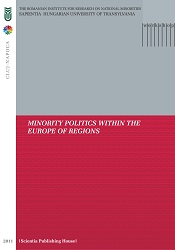Personal Autonomy and/or National Councils in Vojvodina
Personal Autonomy and/or National Councils in Vojvodina
Author(s): Csaba Máté Sarnyai, Tibor Pap
Subject(s): Politics / Political Sciences
Published by: Scientia Kiadó
Keywords: global social risks; the regionalisation of the Voivodeship; National Councils
Summary/Abstract: One of the greatest political challenges of the 21st century is the local treatment of global social risks. Among these, the establishment of the possibility of legal power to enforce interests is of utmost importance. An essential element of this is the involvement of an ever-growing layer of voters into decision making. However, these days, this fell into the background because of the current and acute economic challenges. The focus of the problem seems to be shifted. The reason for this shift is to be found in the appearance of the so-called electoral democracies in the former Eastern block and in the spreading of universal suffrage. These weaknesses derive from the internal logic of the institutions that are supposed to establish democracy. From these, the most significant problem is provided by the difficulties of expressing minority interests in the currently operating parliamentary systems. The European Union set the goal to preserve the cementing force of the member states. This political effort placed on regional bases highlighted some average (NUTS 2.) solutions of the issue. These include e.g. the settling practice of British, Spanish, Belgian, and Italian ethnic and national minority challenges covering several decades back in time. For the new millennium, the problem-solving models have become more universal, globally followable, and exemplary models. After some time, they have become the basic guiding requirements of democracy for the EU applicant countries. Among others, this motivated Serbia when it wanted to provide EU-conform answers for the challenges arising from its multiethnic population structure and heterogeneous geographic structure deriving from the local forms of territorial and personal autonomies. An example for the first is the regionalisation of the Voivodeship (the so-called statute-debate) coming from below while an example for the latter is the issue of the representability of national minorities constituting separate cultural worlds (the so-called National Councils). This presentation wants to use the case of the Hungarians in Serbia to highlight the political consequences of the problem and its handling in a social-theoretical framework. We want to handle the following separately: 1. the institutions that actually came or are coming into being as a result of political compromises; 2. their reception in political discourses; 3. their politological consequences that can be derived from the normative character of the long-term perspective: the development of the partner nations from monolith national states into an equal community. In the course of our investigation, we will draw a parallel between the solutions of the above mentioned European examples and the Western Balkan efforts that can be found in a narrower environment. In our comparison, we try to present the institutional possibilities arising from the different situations of politically relevant and residuary minorities. We will also elaborate on the problem of theoretical and practical classification possibilities of minority role-taking (loyalty, protest, and leaving). Meanwhile, we keep in mind that the arising local solutions should also serve the guiding institutional elaboration of the global challenges of the 21st century.
Book: MINORITY POLITICS WITHIN THE EUROPE OF REGIONS
- Page Range: 251-276
- Page Count: 26
- Publication Year: 2011
- Language: English
- Content File-PDF

